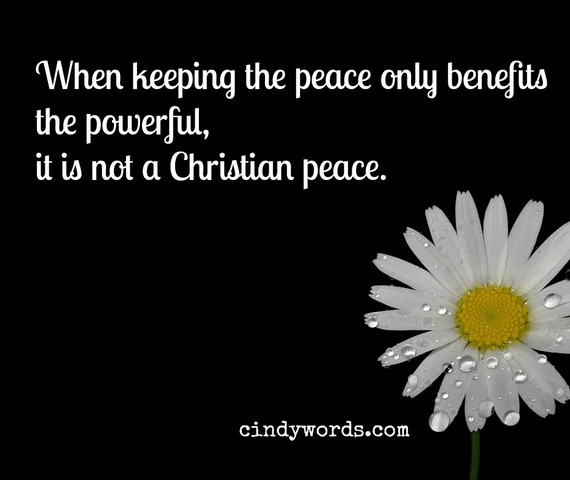When I was living in China, taxis were a convenient and cheap mode of transportation. One time, our taxi driver got into a small fender bender. The cabbie of the offended party got out of his car and began walking towards us shouting angry retorts, garbled in the thick Tianjin accent I was yet getting used to, laced with a few profanities. In a few strides he came to reach past the rolled down window of our driver and landed a punch. An all out fist fight was brewing while in the backseat my toddler blew spit bubbles at me.
When I tell my China stories, they come out sounding outlandish without me embellishing with details. The reality is, it was quite a part of our ordinary lives to witness fist fights in China. Taxi drivers wore their road rage on the outside, shoving when necessary, hitting when riled up.
It happened all the time.
In my initial stages of culture shock, I was extremely uncomfortable and frightened when physical violence broke out like that, but I soon realized that nobody ever ends up being (very) hurt. 13 million people lived in our city so every fight was a public spectacle. Before long, a mob of people would descend upon the two men engaged in a fist fight and forcibly break them up. The ladies get in there too, which I love.
"Suan le ba, suan le ba," they would say, "just forget it, let it go." At this point, the men being dragged away from each other would punch a few more times into the air at the other guy, just for show, and go back to regular programming.
The act of breaking up fist fights were physical and volatile, and it was always done by a group of people. Not necessarily because the strength of the fighting men required it, but more as a signal of group solidarity.
We want you to stop fighting.
Peace, with its connotation of tranquility and stillness, is the Christian's most misunderstood concept. We have long sought to keep peace by silencing dissent under the guise of pursuing unity, coated with a zealous concern for niceties, unwilling to budge a status quo. We forget to ask the crucial question: for whom do we keep peace?
Because wherever peace is elusive, the first ones to suffer are the vulnerable.
When corporations engage in legal battles, employees who don't get a vote have the most at stake.
When marital tensions rise high, children's tender spirits lay at the parents' mercy.
When war ravages a country, the displaced peoples helplessly suffer.
When keeping the peace only benefits the powerful, it is not a Christian peace. The sweet baby Jesus portrayed in sentimental Christmas cards has taken an abrupt departure from the kind of peace we see Jesus embody in Scripture. Even as an infant, the baby Jesus so disrupted the power authorities of the day that sent them scrambling into every home killing firstborn baby boys.
The same Jesus grew to preach radical teachings such as: the first shall be last, love your enemies, grace and mercy shall transcend the law. This Prince of Peace turned tables in a marketplace of greed, shared meals with unclean people, and wept with grieving women. This King marched into Jerusalem on a donkey, was tried by the reigning religious authority of the day, and was executed as a political dissident. His peace did not protect the powerful, it disrupted the systems, brazenly paving a new way and inviting those in the margins to follow.
Christian peace is not about coddling people's fear of conflict. It isn't about making sure everyone is comfortable. It does not silence those for whom a lack of peace is a life or death situation. The irony is that often, the ones with feeble power are the ones who are told to keep peace and remain silent.
When the society is disrupted by scandalizing conflict, whether it is the Bill Cosby rape accusations, or the "harsh disciplinary methods" of certain celebrity parents, or an entire neighborhood weary of losing their young men to police violence, the Christian dare not keep peace by silencing the voice of the victims. Instead, we must make room for the disruptions to take place, to let the voices of those marginalized wear down the reigning power structures. The Christian should not accuse the cries of minorities as "oversensitive," the desperate pleas of abuse victims as "unforgiving," and the repetitive calls for gender equality as "whiny," or "shrill."
If the scandal disturbs us, upsets us, makes us uncomfortable, then we may congratulate ourselves for being on the right track to peacemaking, because that is also where Jesus began. The reigning Roman Empire of Jesus' day appeared peaceful. Merchants were flourishing, the economy was booming, the religious structures intact to maintain order and complicity from her citizens. Yet behind that veneer of civilization was a superficial peace extracted from violence, a society built on the backs of slave labor and spiritual oppression of legalism.
The cross pierced that veneer, exposing a false peace to make way for lasting peace. Jesus took real action for peace, even when it cost his life. As followers of Jesus, let's shed the passivity of peace-keeping in exchange for active engagement of peace-making. Like the mobs on the Chinese streets, let's not walk past the disruptions of peace by turning a blind eye, but involve ourselves with our hands and feet.
In solidarity we proclaim: we demand true peace.
Cindy writes at cindywords.com. Follow her on Facebook.

